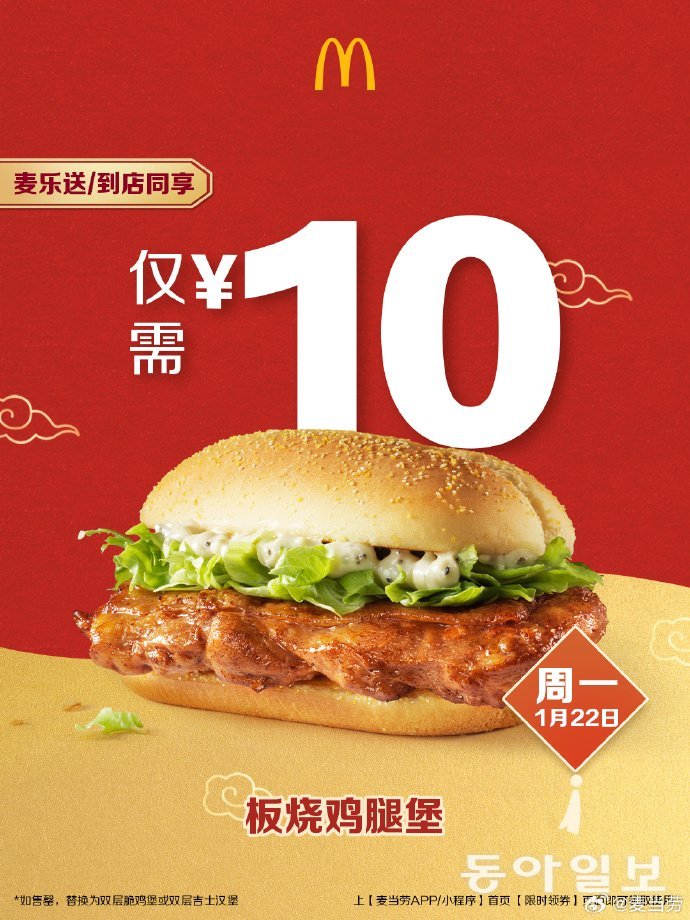China, which is suffering from the double whammy of a severe consumption cliff and a sluggish real estate market, is struggling to find a breakthrough. Companies are competing with ultra-low prices to open consumers’ wallets, and the government has decided to allow real estate companies to take out debt to repay debt in order to revive the real estate market. They also proposed measures to revitalize the economy by releasing more money into the market.
According to Chinese media outlets such as Fengpai, McDonald’s China’s online ordering system went down at one point on the 24th. Feng Pai said, “McDonald’s is holding an event to discount certain products by 10 yuan (about 1,800 won) starting on the 15th.” He added, “The original prices of these products are 30 yuan (about 5,600 won) and 40 yuan (about 7,500 won). “But because the discount was so large, the system went down due to a backlog of orders.”
 McDonald’s in China is holding a promotion where it sells one item every day for 10 yuan. Promotional material posted on Weibo. Chinese McDonald’s Weibo capture
McDonald’s in China is holding a promotion where it sells one item every day for 10 yuan. Promotional material posted on Weibo. Chinese McDonald’s Weibo captureMcDonald’s originally planned to hold the ’10 Yuan Burger’ event only until the 25th. However, after confirming the explosive response from consumers, it is reported that they are considering extending the event or launching other ultra-low-price products.
McDonald’s, the world’s largest fast food company, launched the ’10 Yuan Burger’ in China, which appears to be an attempt to open the tightly shut wallets of Chinese consumers. In the industry, the prevailing analysis is that the more the ’10 yuan burger’ is sold, the more McDonald’s loses. Nevertheless, the fact that McDonald’s is considering extending its discount event shows that China’s consumption slump is serious.
 A promotional material posted on Weibo by Luckin Coffee, China’s largest coffee chain, on the 22nd. It says that they are holding an event to sell coffee for 9.9 yuan. Luckin Coffee Weibo capture
A promotional material posted on Weibo by Luckin Coffee, China’s largest coffee chain, on the 22nd. It says that they are holding an event to sell coffee for 9.9 yuan. Luckin Coffee Weibo captureAs it is predicted that China’s deflationary pressure (falling prices amid an economic recession) will increase this year, other large retailers are also entering the low-price competition. Alibaba’s grocery chain Frecipo recently decided to cut prices on more than 5,000 items. KFC also introduced a new hamburger set priced at 20.9 yuan (about 3,800 won), and Luckin Coffee, a local Chinese brand, is pursuing a low-price strategy by selling a cup of Americano for 9.9 yuan. Apple, which rarely holds discount events, is also selling most of its products, including its latest smartphone, the iPhone 15, at 6-8% lower prices in China.
The Chinese real estate market recession continues. According to Taiwan’s Tsuyu Times on the 24th, a real estate company in Tianjin, China was even fined for putting up an advertisement saying, “Buy a house and get a wife for free,” meaning, “If you own a house, you can easily get a wife.” I asked. In a situation where the real estate market is at rock bottom, they are going to great lengths to secure customers. A construction company in Zhejiang Province, China, even promised to pay gold bars to people who purchase houses.
Chinese authorities are taking measures to revitalize the real estate market. According to Chinese media outlets such as Xinjingbo on the 25th, the People’s Bank of China, China’s central bank, decided to allow companies with profitable real estate to borrow against it to repay existing debt. Until then, it was illegal to repay debt with this type of loan.
The reason the authorities allowed ‘repayment of debt by taking out debt’ is because of concerns that the real estate market downturn could be prolonged if real estate companies with high-quality assets collapse. Xin Jingbo evaluated, “This measure will play a positive role in improving the financial situation of real estate companies.”
Chinese authorities plan to release more money into the market to help the economy recover. The People’s Bank of China plans to supply about 1 trillion yuan (about 188 trillion won) to the market by lowering the deposit reserve ratio by 0.5 percentage points starting February 5. The reserve ratio is the ratio of cash that a bank must have in preparation for customer demands. Lowering the reserve ratio increases the amount of money banks can utilize, which has the effect of releasing money into the market. The People’s Bank of China cut the reserve requirement ratio by 0.25 percentage points in March and September of last year, but this time the reduction is larger. This is interpreted to mean that the will to stimulate the economy is strong.
Beijing =
Source: Donga
Mark Jones is a world traveler and journalist for News Rebeat. With a curious mind and a love of adventure, Mark brings a unique perspective to the latest global events and provides in-depth and thought-provoking coverage of the world at large.